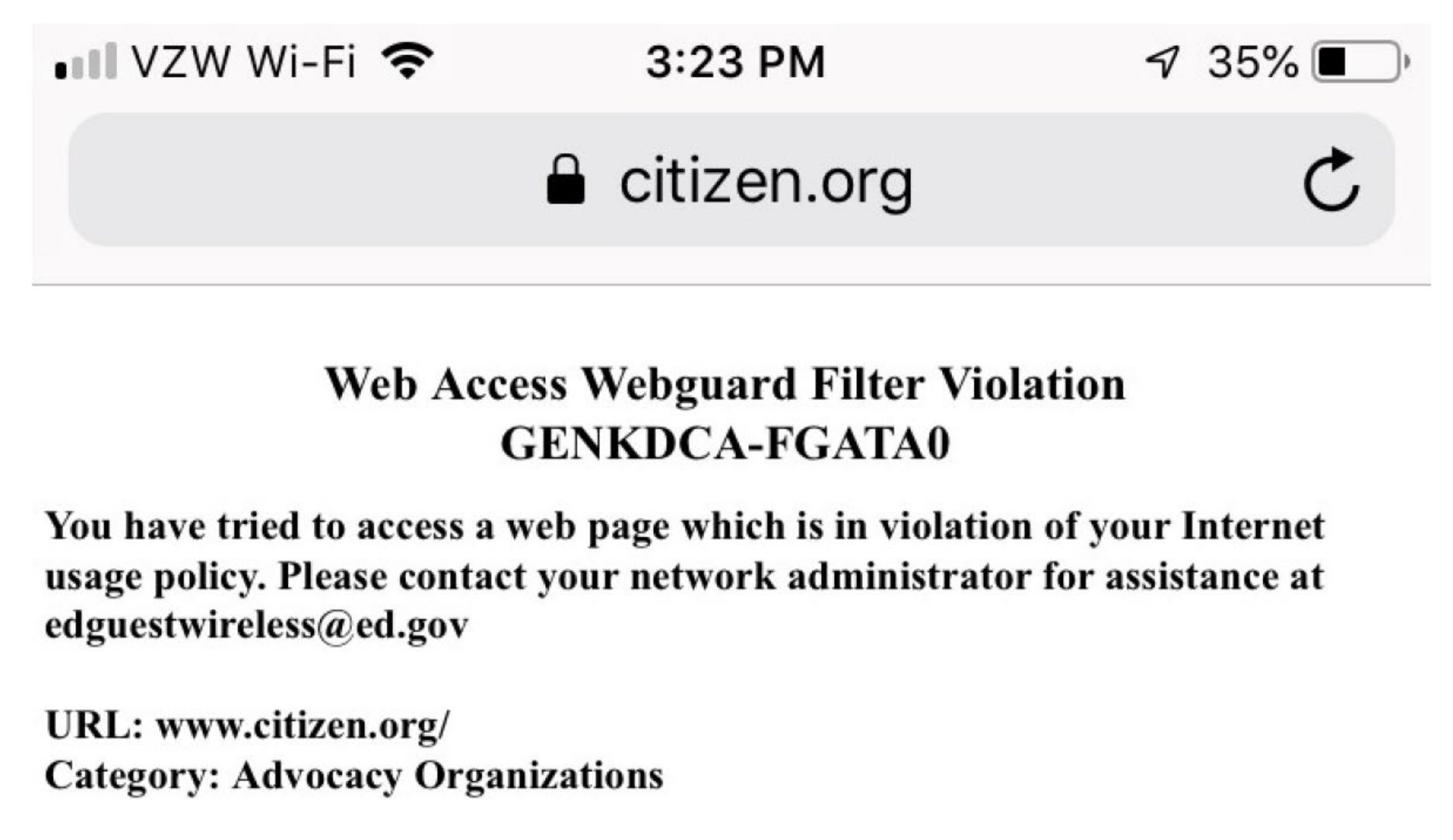At Education Department, Public Citizen Website Was Blocked as ‘Adult/Mature’ Content
Public Citizen News / November-December 2019
By Angela Bradbery

This article appeared in the November/December 2019 edition of Public Citizen News. Download the full edition here.
When David Halperin went to the U.S. Department of Education last year for a meeting and tried to access Public Citizen’s website on his computer, he got a strange error message:
“Web Access Webguard Filter Violation … You have tried to access a web page which is in violation of your Internet usage policy. … Category: Advocacy Organization.”
It happened the next time he was there, and the next. It also happened to a Public Citizen attorney who attended a meeting at the department.
Their discovery prompted Public Citizen to sue the Education Department in April for violating the First Amendment. As a result of the litigation, Public Citizen’s website is no longer blocked on the department’s Wi-Fi and employee internet networks.
The litigation revealed the bizarre reason that access to citizen.org was blocked at the department: The website was classified as “adult/mature” content that was inappropriate for viewing on the department’s networks. The site had been lumped in with pornography and gambling sites.
“I found it bizarre,” said Halperin, a Public Citizen Foundation board member and lawyer who attends hearings and multi-day meetings at the department for his work. “The reason given on the screen when I tried to access citizen.org was ‘advocacy organization.’ But advocacy is at the core of free speech activity.”
Public Citizen staffers became concerned that Education Secretary Betsy DeVos and her staff had blocked access to the website because of disagreement with our work in recent years pushing for strong protections for student borrowers.
Public Citizen’s website includes a wide range of information, including material critical of the department and DeVos. A December 2018 report provided a critical analysis of grant-to-loan conversions under the department’s TEACH Grant program, for instance. The website also has information about how Public Citizen successfully challenged the department’s delay of a rule to protect students from predatory for-profit colleges and how the organization supported another rule designed to protect students from exploitation by unethical for-profit colleges.
But the lawsuit revealed that DeVos was not the source of the problem.
Instead, the problem stemmed from the Education Department’s web filtering service provider, a company called Fortinet. Fortinet classifies websites for filtering purposes, and it had correctly tagged Public Citizen as an advocacy organization. But Fortinet also classifies the websites of advocacy organizations as a type of “adult/mature content,” the same category as websites devoted to pornography or gambling. As a result, when the department asked Fortinet to block “adult/mature content” on its network, Fortinet also blocked the websites of advocacy organizations, such as Public Citizen.
“Federal agencies understandably may want to block access to material inappropriate for a workplace environment,” said Nandan Joshi, the Public Citizen attorney who handled the case. “But when an agency blocks access to the websites of advocacy organizations, it violates the First Amendment right of the organization to speak and of people seeking to visit the websites to access that speech.”
In response to the lawsuit, the department adjusted its web filter so that advocacy organizations will no longer be blocked on its networks. Because Public Citizen’s site is now accessible at the department, Public Citizen dismissed the lawsuit in September.
But the websites of other groups may face the same problem at other federal agencies that use Fortinet’s services. Public Citizen urged Fortinet to remove the “advocacy organizations” subcategory from the “adult/mature” category in July, but the company declined. As a result, other federal agencies that use the company’s Fortiguard web filtering service may still be violating the First Amendment by blocking access to advocacy groups’ websites.
Public Citizen encourages internet security personnel at other agencies – particularly those that use Fortinet’s web filtering services – to review their web filtering settings and make any changes needed to ensure compliance with the First Amendment.
“This case highlights the increasing control of technology companies over what information Americans see and hear,” said Joshi. “But when the government is involved, officials have an obligation to uphold the Constitution and cannot turn a blind eye by outsourcing their responsibility to private contractors. Instead, they must engage in continuous, vigorous oversight over their operations to maintain compliance with constitutional requirements.”